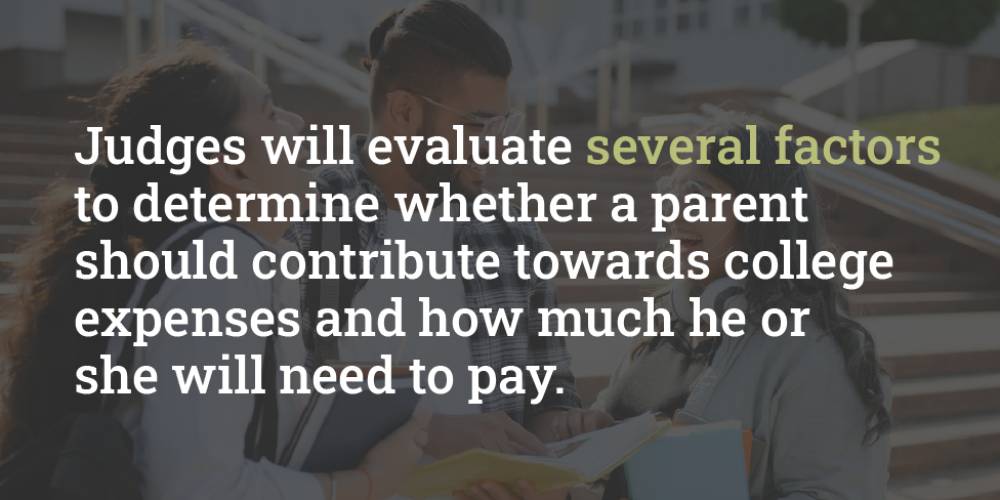630-462-9500
After Hour New Client Telephone Number 630-690-6077
1776 S. Naperville Road, Building B, Suite 202,
Wheaton, IL 60189
Can a Judge Force Me to Pay My Child's College Tuition if I Cannot Afford It?
 When parents divorce or separate, one of the most pressing issues they typically face is how to provide for their children's needs, including education. While child support normally ends when a child turns 18 or graduates from high school, Illinois courts may require a parent to contribute to college expenses. Depending on their financial situation, parents may wonder what will happen if they cannot afford to pay this significant fee. If you are dealing with this complex issue, an Illinois divorce lawyer can help protect your rights and work toward a fair resolution.
When parents divorce or separate, one of the most pressing issues they typically face is how to provide for their children's needs, including education. While child support normally ends when a child turns 18 or graduates from high school, Illinois courts may require a parent to contribute to college expenses. Depending on their financial situation, parents may wonder what will happen if they cannot afford to pay this significant fee. If you are dealing with this complex issue, an Illinois divorce lawyer can help protect your rights and work toward a fair resolution.
What Does Illinois Law Say About Paying for College Expenses?
Under state law, Section 513 of the Illinois Marriage and Dissolution of Marriage Act allows courts to order parents to contribute to the educational expenses of their non-minor children. This obligation is separate from standard child support and can include:
-
Tuition and fees
-
Room and board, whether it is for on-campus or off-campus housing costs
-
Medical expenses, including health insurance
-
Books and other necessary supplies
-
Living expenses like transportation or utilities
Illinois courts do not automatically require parents to pay these expenses. Instead, judges will evaluate several factors to determine whether a parent should contribute and how much he or she will need to pay.

How Does a Judge Decide If You Must Pay for College Tuition?
The court considers multiple factors when deciding if a parent must contribute to college expenses. These factors include:
-
Both parents' financial resources: The court will assess each parent's income, assets, and overall financial situation. If a parent has limited resources and cannot afford to contribute, the court may choose to reduce or eliminate their obligation.
-
The child's financial resources: The court may take the child's savings, scholarships, or a part-time job into account when determining the parents' contribution.
-
The standard of living the child would have enjoyed if the parents were together: Judges often aim to ensure that the child can pursue an education at a level similar to what he or she would have experienced if his or her parents were still married.
-
The child's academic performance and career goals: A judge will assess whether the child is serious about education, maintaining good grades, and pursuing realistic career goals. Courts may deny contributions if the child is not committed to their studies.
What Happens If You Genuinely Cannot Afford to Pay?
Courts recognize that financial hardships can arise and will review your situation. If you cannot afford to contribute to your child's college tuition, you should provide clear and thorough evidence of your financial circumstances. This may include:
-
Submitting proof of your income and expenses
-
Demonstrating your other financial obligations, such as supporting younger children or paying off debt
-
Showing how your current financial situation would make it impossible to pay for tuition without causing significant hardship
Can a Judge Enforce a Tuition Agreement Made During the Divorce?
Many divorce settlements include provisions for future college expenses, often referred to as college contribution clauses. These agreements define how much each parent will have to pay and under what conditions they will need to do so.
If you previously agreed to a college contribution plan during your divorce but cannot afford it when it is relevant for your child, you may need to modify the order. Courts can adjust prior agreements if there has been a significant change in circumstances, such as job loss, health issues, or other financial difficulties.
Can a Child's College Choice Affect the Court's Decision?
The child's choice of college can significantly impact the outcome of whether you will pay for his or her college expenses. Judges often consider the school to be a reasonable choice based on its costs and the family's financial situation. For example:
-
Private Schools: If a child chooses an expensive private school over an affordable public option, the court may limit the parents' financial obligations to what they would have paid for an in-state public university.
-
Out-of-State Schools: Courts might factor in the higher costs of out-of-state tuition when determining whether the expense is reasonable.
A parent may not be required to fund an education at a specific university if it exceeds what he or she can reasonably afford.
What Options Do You Have If You Disagree with the Court's Decision?
If a judge orders you to pay an amount that you believe is unreasonable or unaffordable, you have the right to appeal the decision. However, appeals can be complex and time-consuming, so it is essential to work with an attorney to determine the best course of action.
Another option is to work with the other parent to reach a mutual agreement outside of court. Mediation or informal negotiation may lead to a compromise that better reflects your financial reality and avoids the need for court intervention. A mediator or attorney can facilitate these discussions to ensure they are productive and focused on the child's best interests.
What Are the Alternatives to Court-Ordered College Contributions?
Parents and children can work together to explore alternative ways to manage college expenses without involving the court. These options may include:
-
Applying for scholarships and grants: Encourage your child to pursue financial aid opportunities to reduce tuition costs.
-
Exploring community college or in-state options: Attending a community college for the first two years can vastly lower expenses.
-
Creating a payment plan: Families may agree on a manageable payment plan for the parent and the child to share college costs over time.
-
Taking out student loans: While not ideal, student loans can help cover gaps in funding when parents cannot afford to pay out of pocket.
By working collaboratively, families can find various ways to make college education affordable without overburdening either parent.
Contact a DuPage County, IL Family Law Attorney for Guidance
Navigating court-ordered college tuition payments can be challenging, especially if you cannot afford the costs. A Wheaton, IL child support attorney at The Stogsdill Law Firm, P.C. can help you understand your legal options, effectively present your case, and advocate for a reasonable outcome. Whether you need assistance with modifying an existing order or defending your financial limitations in court, we are here to help. Call 630-462-9500 today to schedule a consultation and learn how we can assist you with your concerns about college contributions.




















